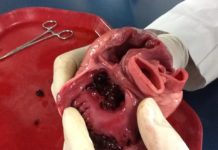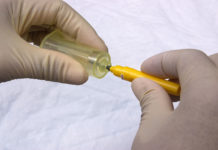
Parents with more than one child and with less education more prone to depression while a baby is very sick
Having a sick child is never easy. Having a very sick baby in neonatal ICU is even more trying. So much so that it can land parents into depression.
New research shows that young parents are more likely to have persistent symptoms of depression. It could linger up to six months after their newborn is discharged from the neonatal intensive care unit (NICU). The symptoms are further aggravated in parents with less education and more than one child to care for.
The findings were a part of Children’s National Health System research presentation during the Pediatric Academic Societies 2018 annual meeting.
“Using a validated screening tool, we found that 40 percent of parents in our analyses were positive for depression at the time their newborn was discharged from the NICU,” says Karen Fratantoni, M.D., M.P.H., a Children’s pediatrician and the lead study author.
She added: “It’s reassuring that, for many parents, these depressive symptoms ease over time. However for a select group of parents, depression symptoms persisted six months after discharge. Our findings help to ensure that we target mental health screening and services to these more vulnerable parents.”
Median length of time the newborns remained in the NICU was 18 days. When the newborns were discharged, 40 percent parents had elevated depression scores
Mothers of preterm and full-term infants who are hospitalized in NICUs are at risk for mood disorders, including postpartum depression. The Children’s research team sought to determine how many parents of NICU graduates experience depression and which characteristics are shared by parents with elevated depression scores.
Eighty-four percent of the study parents were women. Nearly 61 percent of their infants were male and were born at a median gestational age of 37.7 weeks and mean birth weight of 2,565 grams.
The median length of time these newborns remained in the NICU was 18 days. When the newborns were discharged, 50 parents (40 percent) had elevated depression scores. By six months after discharge, that number dropped to 17 parents (14 percent).Their mean age ranged from 26.5 to 30.6 years old.
“Parents of NICU graduates who are young, have less education and are caring for other children are at higher risk for persistent symptoms of depression,” says Dr. Fratantoni. “We know that peripartum mood disorders can persist for one year or more after childbirth so these findings will help us to better match mental health care services to parents who are most in need.”












